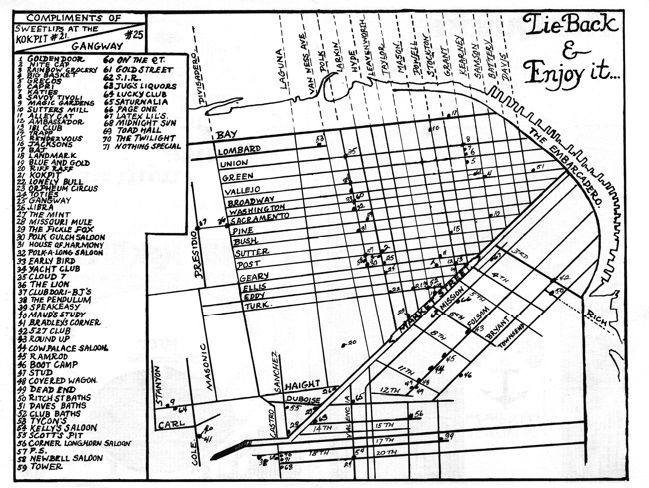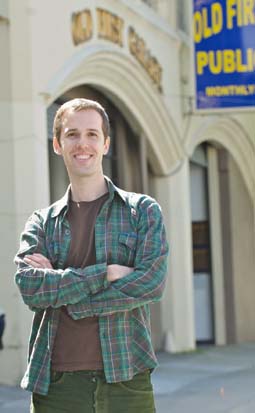Difference between revisions of "Polk Street"
| Line 95: | Line 95: | ||
| − | Curator biography: [[Image:JoeyPlaster.jpg|thumb|Joey Plaster.]] Joey Plaster is a widely published freelance journalist with experience at The Nation, Alternet, and Z Magazine. Plaster is a graduate of Oberlin College, where he studied history and produced documentaries and publications investigating issues of race, class, and gender within LGBT communities. In recent projects sponsored by San Francisco's GLBT Historical Society, he created an online, multimedia archive of [www.oberlinlgbt.org/ Oberlin’s LGBT history] and is currently project director of the [http://www.glbthistory.org/PolkProject/index.html/ Polk Stories Project]. He sits on the GLBTHS’s Oral History Initiative and has worked as a researcher for community-based non-profits. | + | Curator biography: [[Image:JoeyPlaster.jpg|thumb|Joey Plaster.]] |
| + | |||
| + | Joey Plaster is a widely published freelance journalist with experience at The Nation, Alternet, and Z Magazine. Plaster is a graduate of Oberlin College, where he studied history and produced documentaries and publications investigating issues of race, class, and gender within LGBT communities. In recent projects sponsored by San Francisco's GLBT Historical Society, he created an online, multimedia archive of [http://www.oberlinlgbt.org/ Oberlin’s LGBT history] and is currently project director of the [http://www.glbthistory.org/PolkProject/index.html/ Polk Stories Project]. He sits on the GLBTHS’s Oral History Initiative and has worked as a researcher for community-based non-profits. | ||
Revision as of 20:25, 1 May 2009
Index for Polk Street: A Study of Transitions
The buck has always been the bottom line on San Francisco's Polk Street, a coveted bloc of central city space long zoned by the City as a commercial corridor. The economic principles that would help create a gay neighborhood in the late 1950s -- and facilitate the growth of gay economic, social, and political strength -- would also lead to its demise by the early 2000s. This essay is not a comprehensive history of Polk Street. Instead, it is an attempt to trace the street’s primary economic shifts over the past sixty years in the context of both a changing city and GLBT political center.
1960s to 1970s: Polk Street Emerges as a Gay Economic Engine
- "Mom and Pop" to Gay Mecca
- A Citywide Blue-collar Economy Evaporates
- Blue-collar Heterosexual Taverns and Restaurants “Turn Gay”
- The Tavern Guild and Imperial Court
- Commercialized Sex and Economic Uplift
- Economic Power to Political Power
1960s to 1970s: Queer Sex Work Zones Shift
- Market Street and Union Square Sex Work Economies
- Redevelopment Displaces Sex Work Economies
- “Trade” Sex Work Moves to Polk Street
- Polk Street Merchants Push Back
- Police sweeps to social service
Late 1970s to 1990s: Polk Street Sex Work Economy
- Polk Street Gay Commercial Health Undermined
- Gay Bars “Turn Hustler”
- A Polk Street Sex Work Economy
- Sex Work Economy Breaks Down
- Dynamics of Polk Street Sex Work Change
- Polk Street Homelessness
Late 1990s-2008: Dot.com Boom and “Gentrification”
- Dot.com Boom
- “Bottom feeder” Bars to Upscale “Metrosexual” Bars
- Vestiges of Economy: Polk Street Homelessness
Epilogue: the Rise and Fall of a Polk Street Hustler
Index for "Polk Street: Lives in Transition"
“Polk Street: Lives in Transition” examines Polk Street’s history through the lens of current neighborhood change, focusing on the 1980s to the present. We ask: what does it mean for San Francisco’s identity as a “safe haven,” and for its queer sociability and politics, that Polk Street’s economy and culture is changing so dramatically? In an effort to better understand the actions and attitudes of Polk Street denizens, we present personal histories from stake-holders who are living through and shaping these changes.
"Saving People"
"The litter of a changing economy"
"A hustler bar becomes a church"
"We Are Family"
Curator biography:
Joey Plaster is a widely published freelance journalist with experience at The Nation, Alternet, and Z Magazine. Plaster is a graduate of Oberlin College, where he studied history and produced documentaries and publications investigating issues of race, class, and gender within LGBT communities. In recent projects sponsored by San Francisco's GLBT Historical Society, he created an online, multimedia archive of Oberlin’s LGBT history and is currently project director of the Polk Stories Project. He sits on the GLBTHS’s Oral History Initiative and has worked as a researcher for community-based non-profits.



